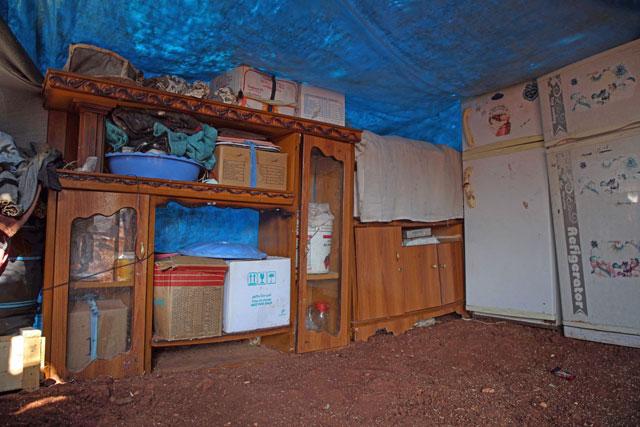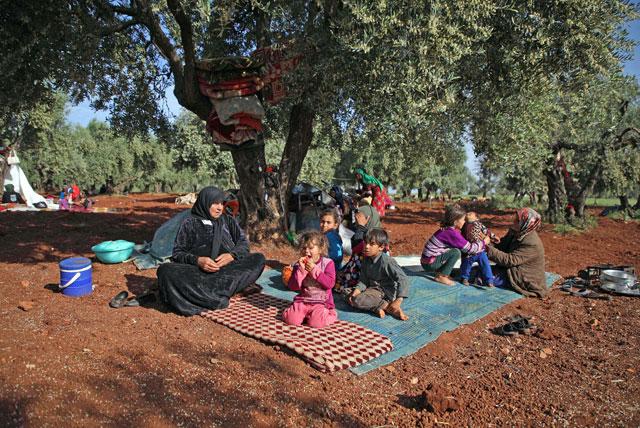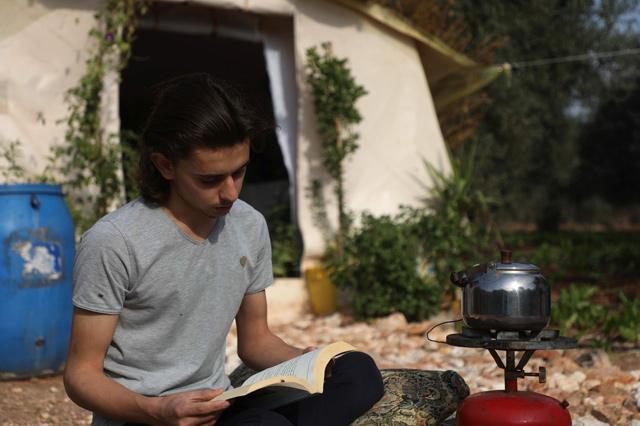You are here
Made homeless by war, Syrians sell furniture to survive
By AFP - Jun 25,2019 - Last updated at Jun 25,2019

Fridges and other appliances of displaced Syrian families are stored in a tent to protect them from the elements in a field near a camp for displaced people at the village of Atme, in the northern Idlib province, on June 13 (AFP photo)
ATME, Syria — For years, Abu Ali sold used furniture and home appliances for a living. But he never thought Syria's war would one day make him homeless and force him to sell his own.
His family is one of dozens stranded in olive groves along the Turkish border, who say they have had to sell their basic possessions to ensure survival.
"I sold them to provide food, drink and clothes for my children," said the father of five, who now houses his family in a tent.
An opposition bastion in Syria's northwest has come under heavy regime and Russian bombardment since late April, despite a truce deal intended to protect the enclave's 3 million inhabitants.
The spike in violence in and around Idlib province has killed hundreds of civilians, displaced 330,000 more, and sparked fears of one of the worst humanitarian disasters in the eight-year civil war.
Abu Ali, his wife and their children fled their home in southern Idlib in early May, hitting the road north to seek shelter in the relative safety of the olive groves close to the border.
"I used to have a shop to buy and sell used items," such as fridges and furniture in the village of Maaret Hurma, he told AFP, sitting in the shade of a tree near the border town of Atme.
‘Very low price’
A few days after fleeing his home village, he hired two trucks for 50,000 Syrian pounds (over $110) to bring "eight fridges, bedroom furnishings, seven washing machines, and several gas stoves" up to the olive grove.
But under the summer sun in the makeshift camp, the merchandise soon plummeted in value.
"I was forced to get rid of it or sell it — even at a very low price," the 35-year-old said, his chin stubble already greying under a head of thick dark brown hair.
For example, the going price for a fridge originally bought for 25,000 Syrian pounds (more than $55) can be as low as a fifth of that price.
In Atme, some families have stored their fridges and other appliances in a single tent to protect them from the elements.
Outside, a top-loader washing machine sits in the shade of a tree.
Awad Abu Abdu, 35, said he too was forced to part with all his household items for a pittance.
"It was very dear to me. It was all I had accumulated over a lifetime of hard work," said the former construction worker, who fled the village of Tramla with his wife and six children.
"I sold all our home's furniture for just 50,000 Syrian pounds," he said, dressed in a faded grey t-shirt fraying around the collar.
After transport costs, he was left with only half that amount to feed his family, he said.
Abu Abdu accused buyers of "cheating us, exploiting the displaced", but said he had no other choice.
"Everything's so expensive... and there are no organisations looking out for us," he said.
‘Forced to sell’
The Idlib region is supposed to be protected by a buffer zone deal signed by Russia and rebel backer Turkey in September.
But the accord was never properly implemented as militants refused to withdraw from the planned cordon.
Hayat Tahrir Al Sham, an alliance led by Syria's former Al Qaeda affiliate, took over administrative control of the region in January.
In the town of Atareb — about 30 kilometres from Atme, in Aleppo province — Abu Hussein received a new delivery at his shop of second-hand household appliances and furniture.
"Every day, more than ten cars arrive loaded up with items the displaced try to sell us," said the 35-year-old.
"This means we have to pay relatively low prices, because the supply is so high" and it's hard to then sell them all, he said.
Back in Atme, 50-year-old Waleeda Derwish said she hoped she would find someone to buy her fridge, washing machine and television, to help her provide for her eight children.
The widow transported the electrical items to "save them from bombing or looting" in Maaret Hurma, she said, a bright blue scarf wrapped around her wrinkled face.
Now the appliances represent the family's only lifeline, she said.
"I'm forced to sell them. How else are we supposed to live?"
Related Articles
ATME, Syria — For nine days, Syrian matriarch Fatima Al Masri has slept under olive trees near the Turkish border, after fleeing a
ATME — More than 300 doctors and nurses rallied on Sunday in the rebel-held Syrian province of Idlib, urging the international community to
ATME, Syria — Among the olive trees in northwestern Syria, displaced teenager Wissam Diab plucks an oud outside his new home, a tent surroun
















